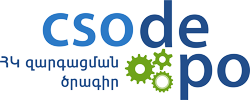Վարքաբանական տնտեսագիտություն և բիզնես օգուոտները թեմայով թրեյնինգների շարք (Անգլերեն)
The series of "Trainings for Industry Executives" conducted in ICARE during 2015-2016 is an initiative implemented by the German Agency for International Cooperation (GIZ GmbH) jointly with ICARE, and funded by EU, under the EU Targeted Initiative for Armenia project.
______________________________________________________________________________
The ICARE - International Center for Agribusiness Research and Education
invites you to participate in a training on
Behavioral Economics and Business Benefits
conducted by
Gnel Gabrielian, PhD
DATES & TIME
The 4-day training will take place on February 15, 16, 17, and 18.
18:30 - 20:30, Yerevan time (this includes a coffee break). For details, see agenda below.
VENUE & TIME
ICARE (International Center for Agribusiness Research and Education).
Address: 74 Teryan Street, 0009 Yerevan.
WORKING LANGUAGE
The working language will be English. Necessary handouts will be provided in advance.
LEVEL
Beginner. Participants are not expected to be familiar with behavioral economics. However, a basic background in statistics is encouraged for regression analysis.
TRAINING FEE
The training is free of charge. Upon successful completion of the training, the participants will be awarded a certificate of participation. To qualify for the certificate, participants must be present in all the sessions.
TRAINING DESCRIPTION
Behavioral economics is a field which combines economic theory with social and cognitive psychology. This behavioral approach offers a wide set of differing potential policy options, making it easy to deal with heterogeneity of human nature. Behavioral models are based primarily on systematic and scientific observations of how individuals actually make choices both in controlled environments and in real world settings. The training will help participants understand the impact of surrounding environment on consumer choices. It will also include a skill-building on designing and collecting data on consumer preferences.
TARGET AUDIENCE
Behavioral models draw on concepts from economics, psychology, and marketing techniques in describing food choice behavior. Armenian consumer market is rather undiscovered. Very little is known about Armenian consumers, about their purchasing habits and what motivates them to buy the specific products and brands. It is also not clear whether their food consumption is based on traditions, income, or the availability of products in the market. The research shows that individuals are heterogeneous in nature and food environments that include the locations, store characteristics, and food variety should be taken into account.
Among the target audience are business executives and marketing specialists who need to understand the drivers of Armenian food consumption – what consumers choose, how and why they choose, whether the consumption is spontaneous or planned, and their willingness to pay for a specific item or a group of items among other things, will allow Armenian businesses to differentiate their products and better target their consumer base in a highly competitive market. This training will be high beneficial for the decision-makers from a wide range of companies such as wholesale/retailing, food and agribusiness, consulting, tourism etc.
EXPECTED OUTCOMES
After completing this training, participants will be able to:
- Understand the product market and consumer preferences that impact the demand structure.
- Develop consumer economic models to analyze willingness to pay and consumer preferences (contingent-valuation and conjoint analysis).
- Develop marketing tools to collect and analyze the information.
- Be able to design studies to collect consumer data on relevant product.
- Be able to use consumer data-collection systems such as Qualtrics.
SOFTWARE
Qualtrics software will be used for demonstration purposes for survey design.
PRESENTATION METHOD
A combination of PowerPoint presentations and in-class computer exercises will be used (the participants don’t have to bring their own notebooks to every session). The participants will be provided with training materials in advance. A dynamic discussion and exchange of ideas through interactive class participation will be strongly encouraged.
